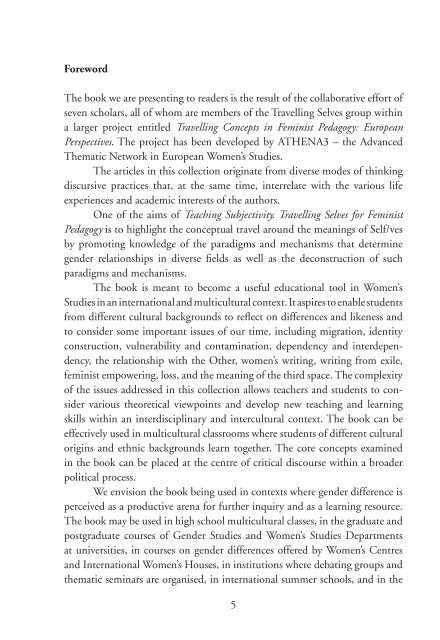Teaching Subjectivity. Travelling Selves for Feminist ... - MailChimp
Teaching Subjectivity. Travelling Selves for Feminist ... - MailChimp
Teaching Subjectivity. Travelling Selves for Feminist ... - MailChimp
Create successful ePaper yourself
Turn your PDF publications into a flip-book with our unique Google optimized e-Paper software.
Foreword<br />
The book we are presenting to readers is the result of the collaborative ef<strong>for</strong>t of<br />
seven scholars, all of whom are members of the <strong>Travelling</strong> <strong>Selves</strong> group within<br />
a larger project entitled <strong>Travelling</strong> Concepts in <strong>Feminist</strong> Pedagogy: European<br />
Perspectives. The project has been developed by ATHENA3 – the Advanced<br />
Thematic Network in European Women’s Studies.<br />
The articles in this collection originate from diverse modes of thinking<br />
discursive practices that, at the same time, interrelate with the various life<br />
experiences and academic interests of the authors.<br />
One of the aims of <strong>Teaching</strong> <strong>Subjectivity</strong>. <strong>Travelling</strong> <strong>Selves</strong> <strong>for</strong> <strong>Feminist</strong><br />
Pedagogy is to highlight the conceptual travel around the meanings of Self/ves<br />
by promoting knowledge of the paradigms and mechanisms that determine<br />
gender relationships in diverse fields as well as the deconstruction of such<br />
paradigms and mechanisms.<br />
The book is meant to become a useful educational tool in Women’s<br />
Studies in an international and multicultural context. It aspires to enable students<br />
from different cultural backgrounds to reflect on differences and l ikeness and<br />
to consider some important issues of our time, including migration, identity<br />
construction, vulnerability and contamination, dependency and interdependency,<br />
the relationship with the Other, women’s writing, writing from exile,<br />
feminist empowering, loss, and the meaning of the third space. The complexity<br />
of the issues addressed in this collection allows teachers and students to consider<br />
various theoretical viewpoints and develop new teaching and learning<br />
skills within an interdisciplinary and intercultural context. The book can be<br />
effectively used in multicultural classrooms where students of different cultural<br />
origins and ethnic backgrounds learn together. The core concepts examined<br />
in the book can be placed at the centre of critical discourse within a broader<br />
political process.<br />
We envision the book being used in contexts where gender difference is<br />
perceived as a productive arena <strong>for</strong> further inquiry and as a learning resource.<br />
The book may be used in high school multicultural classes, in the graduate and<br />
postgraduate courses of Gender Studies and Women’s Studies Departments<br />
at universities, in courses on gender differences offered by Women’s Centres<br />
and International Women’s Houses, in institutions where debating groups and<br />
thematic seminars are organised, in international summer schools, and in the<br />
5

















